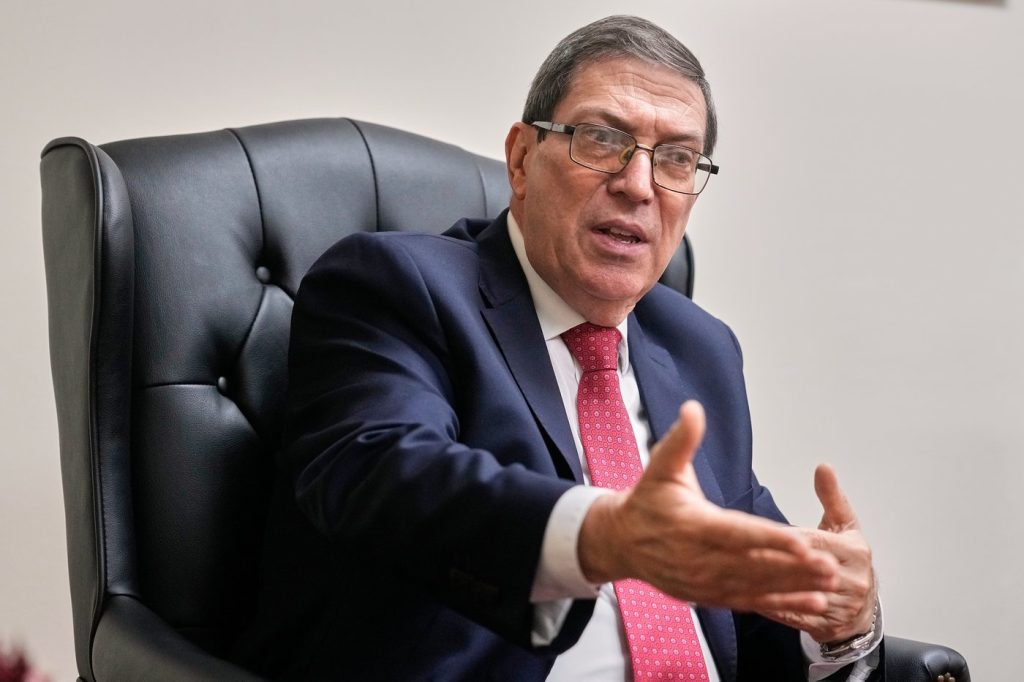The U.N. General Assembly overwhelmingly voted on Wednesday to condemn the U.S. economic embargo of Cuba for the 33rd consecutive year. The vote occurred as Hurricane Melissa was battering the island nation, highlighting the ongoing tensions between Washington and Havana on this longstanding Caribbean issue. With the vote tally at 165 in favor, 7 against, and 12 abstentions, the U.S. and Israel were among those opposing the resolution, along with Argentina, Ukraine, and Hungary. This is a notable decline from the previous year's vote, which had 187 in favor and only two oppositions.
In an interview with the Associated Press, Cuban Foreign Minister Bruno Rodríguez alleged that the U.S. had exerted pressure on several countries, particularly in Europe, to vote against the resolution. Although the U.S. State Department did not provide a comment on these claims, U.S. Ambassador to the U.N., Mike Waltz, characterized the annual vote as a "political theater" staged by Cuba. He urged member states to reconsider their support for the resolution, suggesting it wrongly paints Cuba as a victim while ignoring its role as "the enemy of the United States."
The U.S. argues against labeling the economic restrictions as a blockade, a term used by Cuba to describe the impact of these sanctions on its economy. While U.N. General Assembly resolutions are not legally binding, they do reflect global opinion, providing Cuba an annual platform to showcase its discontent with the embargo. Rodríguez described the yearly votes as powerful messages from the institution, endorsing humanitarian support for a nation grappling with multifaceted challenges, including the recent hurricane's devastation.
In a context where the hurricane was ravaging parts of the island, Rodríguez highlighted the need for international solidarity, suggesting that supporting the resolution would be an act of justice for a people facing adversity beyond economic restrictions. The backdrop of the vote was amplified by the Trump administration's increasing military activities in the region, with ongoing concerns about drug trafficking and speculations regarding an agenda aimed at undermining Venezuelan President Nicolás Maduro.
Cuba's struggles are further compounded by substantial economic crises, worsened since 2020, marked by significant GDP shrinkage, rampant inflation, food shortages, and extensive blackouts. The ensuing waves of protests and large-scale emigration have raised alarms about the nation's stability. Cuban officials attribute these crises to a combination of factors, particularly emphasizing the impact of the COVID-19 pandemic and stringent U.S. sanctions, claiming a loss of over $7.5 billion due to these embargoes. Such economic hardships echo the long-standing grievances stemming from the embargo imposed in 1960, which followed Fidel Castro's revolution that led to nationalization of American properties in Cuba.
The diplomatic landscape shifted briefly during the Obama administration, which saw the restoration of U.S.-Cuba relations and an abstention from the General Assembly vote on the embargo for the first time. However, subsequent administrations, notably that of Donald Trump, reinstated hardline policies against Cuba, reversing many of the previous gestures of reconciliation. Currently, around 80% of Cuba's nearly 10 million residents have lived their entire lives under these sanctions that have incrementally intensified over the years.
The events surrounding the recent U.N. vote and the implications of ongoing U.S. policies continue to shape the narrative of U.S.-Cuba relations, revealing a complex interplay of international diplomacy, domestic distress, and humanitarian concerns.











